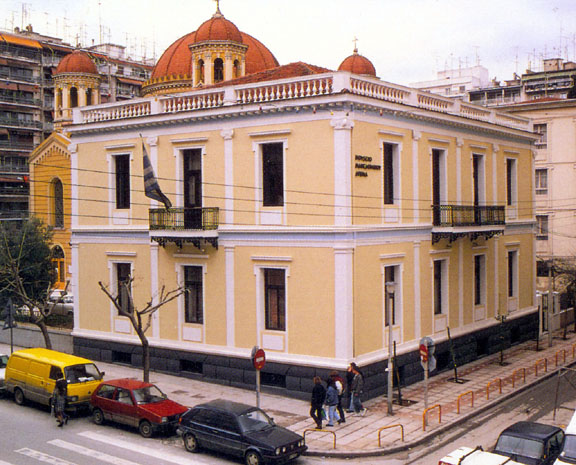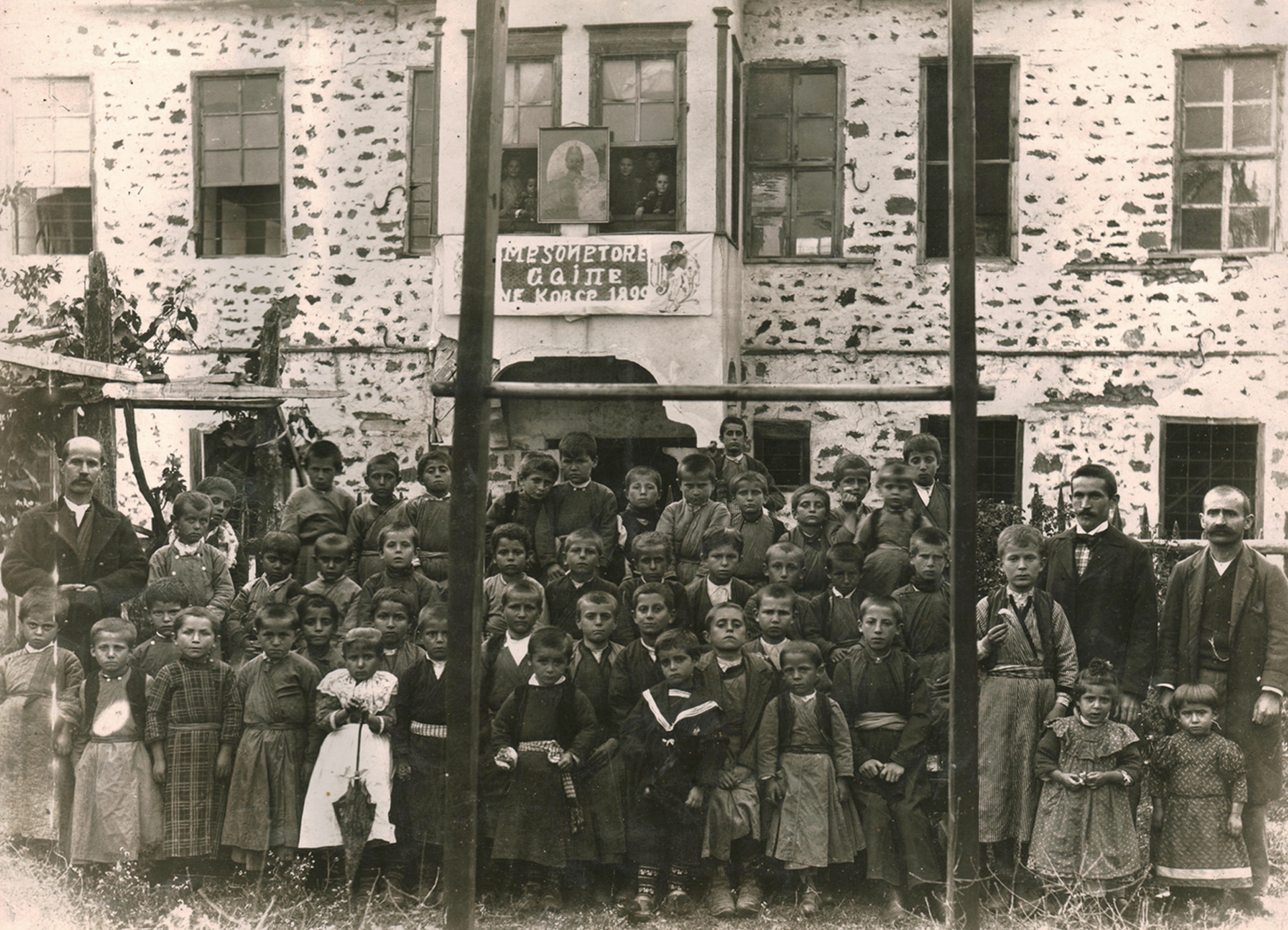|
Lazar Poptraykov
Lazar Poptraykov (; ; 10April 1878October 1903) was a Macedonian Bulgarians, Macedonian Bulgarian revolutionary (komitadji). He was also a Bulgarian Exarchate teacher and poet from Ottoman Empire, Ottoman Macedonia (region), Macedonia. He was one of the leaders of the Internal Macedonian Revolutionary Organization, Internal Macedonian-Adrianople Revolutionary Organization (IMARO) in the region of Kastoria (Kostur) during the Ilinden Uprising. Despite his Bulgarians, Bulgarian identification, per the post-WWII Macedonian historiography he is considered as an ethnic Macedonians (ethnic group), Macedonian. Life Lazar Poptraykov was born in Dambeni, Ottoman Empire (now Dendrohori, Greece) on 10 April 1878. He studied at the local village school before moving to the Bulgarian junior high school in Kostur. Later he continued to study at the Bitola Bulgarian Classical High School and afterwards at Thessaloniki's Bulgarian Men High School. In Thessaloniki, one of his teachers was Pere ... [...More Info...] [...Related Items...] OR: [Wikipedia] [Google] [Baidu] |
Monastir Vilayet
The Vilayet of Manastir () was a first-level administrative division (vilayet) of the Ottoman Empire, created in 1874, dissolved in 1877 and re-established in 1879. The vilayet was occupied during the First Balkan War in 1912 and divided between the Kingdom of Greece and the Kingdom of Serbia, with some parts later becoming part of the newly established Principality of Albania. Administrative divisions Initially the Manastir Vilayet had the following sanjaks: * Sanjak of Manastir * Sanjak of Prizren * Sanjak of Dibra * Sanjak of Scutari After administrative reforms in 1867 and 1877 some parts of the Manastir Vilayet were ceded to newly established Scutari Vilayet (1867) and Kosovo Vilayet (1877). Administrative divisions of Manastir Vilayet until 1912: * Sanjak of Manastir: Kazas of Manastir ( Bitola), Pirlepe (Prilep), Florina, Kıraçova ( Kičevo) and Ohrid. * Sanjak of Serfiğe (Between 1864-1867 and 1873–1892): Kazas of Serfiçe (modern Servia), Kozana (modern Ko ... [...More Info...] [...Related Items...] OR: [Wikipedia] [Google] [Baidu] |
Pere Toshev
Petar (Pere) Naumov Toshev (, ; 1865–1912) was a Bulgarian teacher and an activist of the Internal Macedonian-Adrianople Revolutionary Organization. In the historiography in North Macedonia he is considered an ethnic Macedonian revolutionary. Early life Toshev was born in the town of Prilep, then part of the Ottoman Empire. He studied at the Bulgarian Exarchate's school in Prilep and the Bulgarian Men's High School of Thessaloniki. Later Pere attended the Gymnazium in Plovdiv, capital of the recently created Eastern Rumelia. Here he joined the Bulgarian Secret Central Revolutionary Committee founded in 1885. The original purpose of the committee was to gain autonomy for the region of Macedonia (then called ''Western Rumelia''), but it played an important role in the organization of the Unification of Bulgaria and Eastern Rumelia. During the Serbo-Bulgarian War of 1885, he joined the Bulgarian Army as a volunteer. During 1885–1890 Pere Toshev and Andrey Lyapchev organ ... [...More Info...] [...Related Items...] OR: [Wikipedia] [Google] [Baidu] |
1903 Deaths
Events January * January 1 – Edward VII is proclaimed Emperor of India. * January 10 – The Aceh Sultanate was fully annexed by the Dutch forces, deposing the last sultan, marking the end of the Aceh War that have lasted for almost 30 years. * January 19 – The first west–east transatlantic radio broadcast is made from the United States to England (the first east–west broadcast having been made in 1901). February * February 13 – Venezuelan crisis: After agreeing to arbitration in Washington, the United Kingdom, Germany and Italy reach a settlement with Venezuela resulting in the Washington Protocols. The naval blockade that began in 1902 ends. * February 23 – Cuba leases Guantánamo Bay to the United States "in perpetuity". March * March 2 – In New York City, the Martha Washington Hotel, the first hotel exclusively for women, opens. * March 3 – The British Admiralty announces plans to build the Rosyth Dockyard as a naval ... [...More Info...] [...Related Items...] OR: [Wikipedia] [Google] [Baidu] |
1878 Births
Events January * January 5 – Russo-Turkish War: Battle of Shipka Pass IV – Russian and Bulgarian forces defeat the Ottoman Empire. * January 9 – Umberto I becomes King of Italy. * January 17 – Russo-Turkish War: Battle of Philippopolis – Russian troops defeat the Ottoman Empire. * January 23 – Benjamin Disraeli orders the British fleet to the Dardanelles. * January 24 – Russian revolutionary Vera Zasulich shoots at Fyodor Trepov, Governor of Saint Petersburg. * January 28 – In the United States: ** The world's First Telephone Exchange begins commercial operation in New Haven, Connecticut. ** '' The Yale News'' becomes the first daily college newspaper in the U.S. * January 31 – Turkey agrees to an armistice at Adrianople. February * February 2 – Greece declares war on the Ottoman Empire. * February 7 – Pope Pius IX dies, after a 31½ year pontificate (the longest definitely confirmed). * February 8 & ... [...More Info...] [...Related Items...] OR: [Wikipedia] [Google] [Baidu] |
Eleftherotypia
''Eleftherotypia'' () was a daily national newspaper published in Athens, Greece. Published since 21 July 1975, it was the first newspaper to appear after the fall of the Regime of the Colonels, and for most of its period had been one of the two most widely circulated newspapers in the country. Generally taking a center-left, socialist stance, it was respected for its independence and impartiality. Following the economic downturn in Greece, the newspaper had to file for bankruptcy in 2011. Briefly taken over by a new publisher, lawyer Harris Oikonomopoulos, it was finally shut down in November 2014. Profile From the beginning, ''Eleftherotypia'' had been an opposition voice against the governments of the conservative Nea Demokratia party. Editors often adopted a social-democratic stance on a number of issues, but more radical viewpoints are also frequently represented in the paper, to a notably greater extent than in centre-left daily ''To Vima''. When in 1981 the socialist ... [...More Info...] [...Related Items...] OR: [Wikipedia] [Google] [Baidu] |
Penelope Delta
Penelope Delta (; 24 April 1874 – 2 May 1941) was a Greek author. She is widely celebrated for her contributions to the field of children's literature. Her historical novels have been widely read and have influenced popular modern Greek perceptions of national identity and history. Through her long-time association with Ion Dragoumis, Delta was thrust into the middle of turbulent early-20th-century Greek politics, ranging from the Macedonian Struggle to the National Schism. Early life Delta was born Penelope Benaki () in Alexandria, in the Khedivate of Egypt,"Conference about Penelope Delta at the BA" Bibliotheca Alexandrina< ...
[...More Info...] [...Related Items...] OR: [Wikipedia] [Google] [Baidu] |
Germanos Karavangelis
Germanos Karavangelis (, also transliterated as ''Yermanos'' and ''Karavaggelis'' or ''Karavagelis'', 1866–1935) was known for his service as Metropolitan Bishop of Kastoria and later Amasya, Amaseia, Pontus (region), Pontus. He was a member of the Macedonian Committee, Hellenic Macedonian Committee and functioned as one of the major coordinators of the Macedonian Struggle, Greek Struggle for Macedonia. Early life and career Germanos Karavangelis was born Stylianos in 1866, in the village of Stipsi at Lesbos island, then still under Ottoman Empire, Ottoman rule. His father was a Psara, Psariot by the name of Chrysostomos and his mother was Maria. He had seven other siblings which included six sisters and one brother. When he was two years old, his family moved to Adramyttio, Asia-Minor (now Edremit, Balıkesir, Edremit, Turkey) where his father opened a shop. There, he attended school and was awarded a scholarship to study at the Theological School of Halki. He graduated in 1888 ... [...More Info...] [...Related Items...] OR: [Wikipedia] [Google] [Baidu] |
Macedonian Committee
The Macedonian Committee (, ''Makedoniko Komitato''), formally the Hellenic Macedonian Committee (Ελληνομακεδονικό Κομιτάτο, ''Ellinomakedoniko Komitato''), was a Greek revolutionary organization with the aim of liberating Macedonia from the Ottoman Empire (in the vilayets of Monastir and Salonika). Creation of the committee Despite the prior existence of Greek armed bands in the region of Ottoman Macedonia, it wasn't until 1900 when Stefanos Dragoumis founded the Hellenic Macedonian Committee, that an organized and coordinated effort was undertaken. The committee was led by the wealthy publisher Dimitrios Kalapothakis and its members included Greek aristocrats, politicians, and other Greek notables in addition to the guerrilla fighters. This included individuals such as Ion Dragoumis, Pavlos Melas, etc. The Hellenic Macedonian Committee served as the Greek answer to the IMRO following their increase in hostilities towards the Greek inhabitants of Mac ... [...More Info...] [...Related Items...] OR: [Wikipedia] [Google] [Baidu] |
Konstantinos Christou
Kottas Christou () or Kote Hristov ( Bulgarian/Macedonian: Коте Христов), known simply as Kottas or Kote,, and often referred to as Konstantinos Christou (), was a Slavophone revolutionary chieftain in Western Macedonia during the Macedonian Struggle. A native of Roulia, Kottas served as its village elder and later was involved in anti-Ottoman rebel activity, killing several Ottoman officers. He was first associated with the pro-Bulgarian Internal Macedonian Revolutionary Organization (IMRO) and afterwards with the pro-Greek irregular Hellenic Macedonian Committee. He was captured by the Ottomans, convicted of robbery and hanged in Monastir in 1905. Life Kottas Christou was born in the Patriarchatist village of Roulia (modern Kotas) and was a Orthodox Christian. Kottas was a monolingual Slavophone, "Christos Kota of Roulia, a Slav-speaking kleft" "Deswegen führte der slawophone Grieche Kapetan Kotas oder Kottas" who spoke Bulgarian or Macedonian. He had a G ... [...More Info...] [...Related Items...] OR: [Wikipedia] [Google] [Baidu] |
Maslina Grancharova
Maslina Ivanova Grancharova ( Bulgarian: Маслина Иванова Грънчарова; 1874–1958), also known as the Rayna Knyaginya of Kastoria ( Bulgarian: Костурската Райна Княгиня), was a Bulgarian teacher and revolutionary from the village of Zagorichani ( Bulgarian: Загоричани, present day Vassiliada), Manastir Vilayet, Ottoman Empire. She was a member of the Internal Macedonian Revolutionary Organization (IMRO) and participated in the Macedonian Struggle, most notably in the Ilinden Uprising. She sewed the flag that represented the liberation of Dumbeni (today Dendrochori), Kastoria from the Ottomans and was the flag-bearer for her unit during the Ilinden Uprising."МАСЛИНА ГРЪНЧАРОВА - КОСТУРСКАТА РАЙНА КНЯГИНЯ." ~ ЗАБРАВЕНИ ГЕРОИ ~. Web. 10 May 2011. . Biography Grancharova was born in 1874 in the small village of Zagorichani (today Vasiliada) in Kastoria during Ottoman rule. ... [...More Info...] [...Related Items...] OR: [Wikipedia] [Google] [Baidu] |
Korçë
Korçë (; sq-definite, Korça) is the List of cities and towns in Albania, eighth most populous city of Albania and the seat of Korçë County and Korçë Municipality. The total population of the city is 51,152 and 75,994 of Korçë municipality (2011 census), in a total area of . It stands on a plateau some Above mean sea level, above sea level, surrounded by the Morava Mountains. The area of the Old Bazaar of Korçë, Old Bazaar, including Mirahori Mosque, Korçë, Mirahori Mosque, is considered as the urban core of the city. Founded by the local Ottoman Empire, Ottoman Albanians, Albanian nobleman Iljaz Bej Mirahori, Ilias Bey Mirahori, the urban area of Korçë dates back to the late 15th century and the beginning of the 16th century, however its actual physiognomy was realized in the 19th century, during a period that corresponds with the rapid growth and development of the city. The Old Bazaar has played a dominant role in Albania's market history. Korçë is the larges ... [...More Info...] [...Related Items...] OR: [Wikipedia] [Google] [Baidu] |





